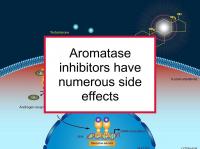A study first presented at the November 2010 American Association for Cancer Research (AACR) meeting has reported the extent of side effects other than musculoskeletal symptoms (such as swelling and stiffness) in women treated with aromatase inhibitors such as Arimidex (anastrozole) and Femara (letrozole).
Aromatase inhibitors, which are a type of first-line hormonal treatment for estrogen receptor positive (ER+) breast cancer, have been shown to have clear benefit in reducing risk of recurrence and increasing survival.
Musculoskeletal symptoms are a well-known side effect of aromatase inhibitors, but other side effects are less well described. The study included 100 breast cancer patients just about to start aromatase inhibitor treatment and 200 cancer-free controls. Questionnaires were used to collect data concerning symptoms and their frequency at the outset of the study (baseline), after three months, and after six months (at which point the study ended).
Even before aromatase inhibitor treatment began, breast cancer cases were more likely than controls to have experienced hot flashes, fatigue, decreased appetite, fever, breast sensitivity, swelling of hands and feet, difficulty concentrating, and a tendency to take naps. This was true even for the patients who had not been treated with chemotherapy. However, aromatase inhibitor treatment was associated with the new onset of the numerous symptoms during the six month follow-up period. Breast cancer patients who began treatment with an aromatase inhibitor were at least five times more likely to experience breast tenderness, hot flashes, and chest pain than age matched cancer-free controls. Patients were also at least four times as likely to experience hair loss, cold sweats, and night sweats, three times as likely to have weight gain and leg cramps, and at least twice as likely to experience a tendency to take naps, forgetfulness, sleep disturbance, depression, cough, irritability, intestinal gas, and interrupted sleep.
The authors conclude that aromatase inhibitor treatment results in an extreme estrogen-deficient state which is associated with the onset of a number of symptoms that occur far more frequently compared to similar women without a history of cancer. These symptoms may impact adherence to aromatase inhibitor treatment.
Please see our article on breast cancer diet during aromatase inhibitor treatment for more information on how to optimize treatment with aromatase inhibitors and reduce side effects.
